- Home
- Mack Reynolds
The Second Mack Reynolds Megapack Page 5
The Second Mack Reynolds Megapack Read online
Page 5
He resumed his journey homeward.
Marget, hands on hips, met him at the door. “Where in kert have you been?” she snapped.
“You mustn’t swear, darling,” he said. “I met another time traveler on the way home.”
“You didn’t…”
“Certainly, why not? If I didn’t somebody else would. ”
“But you’ve already got the closet overflowing with—”
“Now, Marget, don’t look that way. One of these days some museum or collector...”
She grunted skeptically and turned back into the house.
GOOD INDIAN
AUTHOR’S INTRODUCTION
When the late, and beloved in the science-fiction field, John W. Campbell published this in Analog, the blurb read: “This may not be science fiction, but if it isn’t, it should be, and anyway it’s fun.” When he republished it in his yearly anthology of the best Analog stories of the year, he pointed out that the background material is quite valid; the Seminole Indians are still legally at war with the United States. A treaty has never been signed.
—Mack Reynolds
* * * *
Mortimer Dowling opened one eye accusingly and said, “Miss Fullbright, I thought we had a standing agreement that I was never to be bothered while in conference.”
Millie said, “Take your feet off the desk, you’ll scratch it. Am I or am I not your receptionist?”
“You am. Now go away. It was very drunk out last night.”
“A receptionist recepts and…”
Mortimer Dowling opened the other eye, too, and interrupted. “No she doesn’t,” he said severely. “You don’t do enough crossword puzzles. A recept is an idea formed by the repetition of similar percepts, as successive percepts of the same object. A receptionist does something else. I forget what. Go away. I’m tired.”
“...And when someone comes into my office asking for an appointment to see the Director of the Department of Indian Affairs, then it’s my duty to so inform you.”
He closed both eyes and snorted. “Don’t be ridiculous.
“Three of them,” Millie said definitely.
Mortimer Dowling said sleepily, “Three what? Why don’t you go away? Go away and do a crossword puzzle or something.”
“Three Indians to see you, sir,” Millie said formally.
The head of the Department of Indian Affairs opened both eyes again and said severely, “Miss Fullbright, I am in no mood for jest. You know very well that there is no such thing as three Indians. The last Indian died almost ten years ago. The President proclaimed a day of national mourning. I made a speech. It was all very sentimental. Are you going away or not?”
Her mouth tightened. “They say they’re Indians. And they look like Indians. I’ve seen pictures of Indians.”
Mortimer Dowling blinked. “You’re serious?”
“Of course, I’m serious.”
“Three men in the outer office, and they say they’re Indians?” A certain tremor was coming into Mortimer Dowling’s voice.
She nodded definitely.
“Good Heavens,” said the Director of Indian Affairs. “For nearly fifteen years I’ve held this job, and my father before me. By the terms of the final Indian treaty there must always be a Department of Indian Affairs so long as the United States shall endure, the original idea being that the Indians would always have somewhere to go to find justice. It never occurred to those who compiled the treaty that the Indians would eventually blend into the rest of the population. The last bit of business conducted by the department was almost half a century ago. Miss Fullbright, do you realize what you’re saying? There’s actually something for me to do!”
“Yes, sir,” said Millie, overwhelmed by it all. “What shall I tell them?”
Mortimer Dowling sat up straight behind his desk, businesslike. “Now, just what was it they wanted?”
“An appointment.”
He thought about that. “Well, we should give them one, Miss Fullbright. Yes, indeed. An appointment.”
Millie was impressed by the new aggressive mien of her superior. “Very good, sir,” she said.
“Mark it down on the calendar, Miss Fullbright.”
“Yes, sir. When do you wish to make this appointment, sir?”
He thought about that. Finally, decisively, “Now. ”
“Right now?”
“Right now. They might go away and not come back. ”
“Yes, sir.”
There were three of them all right and they came in assorted sizes ranging from a six-footer pushing three hundred pounds to a five-footer pushing ninety pounds. The one in the middle averaged out neatly.
Mortimer Dowling shook hands with enthusiasm. “You have no idea how pleasant it is to meet you chaps,” he said. “Our records show that the last full-blooded Indian died ten years ago. Where have you been keeping yourselves? Miss Fullbright, chairs for these gentlemen.”
When they were seated, Mortimer Dowling looked them over happily. They were Indians all right, all right. You could see they were real Indians.
Mortimer Dowling said, “Yes, sir, a real pleasure. Now then, what can we do for you? The Department of Indian Affairs places its full resources at your disposal, gentlemen.”
The one in the middle said, “We’re Seminoles. We’ve come to sign a treaty.”
Mortimer Dowling’s face went blank. “Seminoles?” he said. “A treaty?”
They gave him one concerted nod, lapsed back into frozen-faced silence. Oh, they were Indians all right.
Mortimer Dowling cleared his throat. “Look here, the government of the United States cleared up all its Indian difficulties over a century ago. We signed final treaties with every tribe.”
“Except the Seminoles,” the one in the middle said. “We represent the Seminoles.” He indicated his hefty companion to the right. “This is Charlie Horse and I’m Fuller Bull, and...”
“You’re what?”
“Who, not what,” the Indian said strictly. “I’m Fuller Bull.”
“Oh,” Mortimer Dowling said. “I thought you said— never mind.” He looked at the small one and tried to place the conversation back on a lighter level with a bon mot. “And I suppose this is Chicken Little.”
“And this is Osceola the Eighteenth,” Fuller Bull said. “We call him Junior.”
Junior spoke up for the first time. “For your information, the three of us took our LL.D.s at Harvard. We carry powers of attorney for all fifty-five of the other surviving members of the Seminole tribe.”
“Fifty-five?” Mortimer Dowling was astounded. “You mean there are fifty-five more of you?”
“Correct,” Charlie Horse said. “And we’ve come to sign a treaty between the Seminole Nation and the United States of America.”
Already Mortimer Dowling was beginning to feel a bead of very cold sweat forming on his forehead. He said anxiously, “Miss Fullbright. Please. The file on the Seminole Indian Nation.”
“Yes, sir,” Millie said. She scooted out. Came scooting back in mere moments, a thin file held in both hands. She put the file before him.
Mortimer Dowling renewed his information on the Seminoles quickly. Scanned paper after paper. Emitted occasional grunts. Finally he looked up at them in satisfaction.
“Now,” he said definitely, “I don’t know what your game is, but it won’t work. More than a century ago, the whole world went through a period of settling its difficulties with its minorities. World opinion grew so strong that not a major power on earth dared do otherwise. Why, even the Sino-Soviet Complex freed its satellites—of course, by that time there was nobody left in the satellites except good commies, so they immediately applied for readmission. However, that’s beside the point. The point is that the United States reviewed every dealing we had ever had with every Indian tribe. Settling all the Indian questions beggared the United States treasury, but we satisfied them all—every tribe, every member of every tribe.” He let his eyes go ceilingward for a m
oment. “As I recall, the hardest to please were the Delawares. There were only three hundred seventy-five of them left, and they got a million dollars apiece.”
“Peanuts,” Charlie Horse said.
“I beg your pardon?”
“Peanuts,” said Charlie Horse.
Mortimer Dowling thumped the papers before him with an emphatic fingertip. “When we attempted to contact the Seminoles we found there were none to contact. They were all gone. The only ones we could find were along the Tamiami Trail and at Silver Springs selling baby alligators and souvenirs made in Japan to the tourists. It turned out they were all Armenians, making an honest living. No Seminoles left.”
“We went underground,” Junior said.
Mortimer Dowling gaped at him. “What?” he said.
“We went underground,” Junior told him. “We realized that the longer we could put off our final settlement with the government, the better off we’d be. Look at history. The great powers start off by butchering the aborigines of the countries they conquer. Then, as time goes by, their conscience begins to hurt and they make wards of those that are left. More time goes by and they begin to wax really sentimental. They seek out the very last survivors and load them with honors, with privileges, sometimes with positions superior even to their own citizens. Look at the British and the Tasmanians, the New Zealanders and the Maoris, the Swiss in Switzerland.”
Millie cleared her throat. “What happened to the Swiss?”
“Finally there were so many more tourists in the country than Swiss that they began to thin out. Like the Chinese used to do, with invaders, only sort of in reverse. The tourist hordes interbred with the Swiss until finally you couldn’t find a full-blooded one. The last man who could yodel died in Berne, twenty years ago.”
Mortimer Dowling said severely, “Let’s get back to the point.”
“The point is,” Charlie Horse said, “that the United States has no treaty with the Seminole Indian Nation. We didn’t sign up when everybody else did. We realized the tribe would benefit more if we hid out, kept secret our existence, put off signing for a full century.”
There was another bead of sweat on Mortimer Dowling’s forehead.
He said weakly, “I assume you have proof, that you can prove that your fifty-eight Seminoles are all full-blooded Indians?”
Junior said, “We’ve planned this, remember, for a whole century. We’ve studied every aspect. There are no loopholes by which you can escape. The United States is the only nation on earth that has not settled its problems with all its minorities. You can imagine the impact of public opinion upon you, if this hits the world’s headlines.”
Mortimer Dowling said hoarsely, “I have before me the treaty we had prepared a hundred years ago. It offers every Seminole one hundred thousand dollars to settle all claims against the United States.”
Fuller Bull chuckled his sarcasm. Junior and Charlie Horse didn’t even bother to do that.
Mortimer Dowling said, “I’ll up it. I’ll promise you the same as the Delawares got. A million dollars apiece for every man, woman and child in the tribe.”
They gave him the oatmeal look.
Mortimer Dowling said desperately, “What do you want?”
“Florida,” said Junior.
“Florida!”
“Florida,” Junior said. “We owned it originally and we’ve never signed it away.”
“Do you realize that half a billion people now live in Florida? Do you realize how much money the citizens of this country have invested in the Florida peninsula in the past three centuries? Why the bridge to Havana alone—
We’re going to make it a toll bridge,” Fuller Bull said with satisfaction.
“And we’re going to confiscate every house, every orange tree, every motel, in the state,” Charlie Horse added. “I get Miami.”
“Miami?” Mortimer Dowling repeated, trying to hold on to reality.
“That’s my share,” Charlie Horse told him.
“Good Heavens,” Mortimer Dowling said.
“We’re going to make every white man move out of the state,” Charlie Horse wound up, with satisfaction.
Mortimer Dowling blurted, “You’ll never get away with this. It’s impossible.”
Fuller Bull said darkly, “If necessary, we’ll take our case to the Reunited Nations.”
“The RN?” Mortimer Dowling said in despair. “We wouldn’t stand a chance. There’s not a country in the RN that hasn’t already cleared itself of every taint of colonialism and imperialism. Why, the very expressions have become bad words.”
The three Seminoles were smug.
Mortimer Dowling looked at his watch. “See here, gentlemen, let’s not be hasty about this.”
“So who’s being hasty?” Junior said. “We’ve waited a hundred years for this moment.”
“Well, see here, we needn’t rush into things. It’s time for lunch. Will you gentlemen be my guests? Ha ha, on Uncle Sam, of course. Do you realize this will make quite a precedent? In my fifteen years as head of this department, I’ve never before had the occasion to submit an expense account.”
The three Seminoles exchanged glances.
“Why not?” said Junior.
* * * *
In the morning, Mortimer Dowling opened one bloodshot eye and said, “Miss Fullbright, please go away. I’m dying.”
Millie said, “Take your feet off the desk. Aren’t you ashamed of yourself?”
“No. Go away. I need rest.”
“Just look at yourself,” Millie said disgustedly. “The first time in fifteen years at this job you get something to do, and what happens? You blow up. Instead of trying to figure out an answer, you go get yourself stoned. Absolutely stoned.”
Mortimer Dowling grunted. He pointed with his finger at an official looking document lying on the desk. “Do you see that, Miss Fullbright? One of the most brilliant pieces of work done by an American official in the past century.”
“Heavens to Betsy, the treaty. And all three of their signatures on it. How in the world did you ever—”
Mortimer Dowling allowed himself a self-satisfied leer. “Miss Fullbright, haven’t you ever heard the old saying The only good Indian is a dead—”
Millie’s hand went to her mouth. “Mr. Dowling, you mean…you put the slug on all three of those poor Seminoles? But…but how about the remaining fifty-five of them? You can’t possibly kill them all!”
“Let me finish,” Mortimer Dowling growled. “I was about to say, The only good Indian is a dead drunk Indian. If you think I’m hanging over, you should see Charlie Horse and his wisenheimer pals. Those redskins couldn’t handle firewater back in the old days when the Dutch did them out of Manhattan with a handful of beads and a gallon of applejack and they still can’t. Now, go away and do a crossword puzzle, or something.”
NO RETURN FROM ELBA
AUTHOR’S INTRODUCTION
Twenty years ago the short-short story, usually about a thousand words in length, was more prevalent than it is now, for reasons unknown to me. I always liked the form. The idea, of course, is to have a snap ending that surprises or amuses the reader. This first appeared in Fantastic magazine in 1953. Then editor, Howard Browne, who is now one of Hollywood’s top scriptwriters, liked it so much that he paid the unheard of, in those days, rate of four cents a word.
—Mack Reynolds
* * * *
The Omnipotent entered and answered their salute as he had in the old days—as though there were still fleets under his command instead of this single space scout—planets still under his thumb, instead of the single tiny asteroid which lay before them.
His voice was still curt, demanding of unthinking obedience. “How long will it be now?”
“Perhaps an hour, Omnipotence.” It was Klier who spoke; Klier the faithful; Klier, his hatchet man, his enforcer, during the years of power; Klier of the cold, vacant eyes.
The Omnipotent stared into the viewplate, his hands clasped behind his
back. They knew—but he didn’t know they knew—of his life-long fascination with the Bonaparte story. They recognized the Napoleonic stance, these last three of his followers, but their faces were blank.
He said, finally, “Voss, how big did you say this asteroid was?”
“A diameter, sire, of 1.784 miles.” Voss alone wore civilian dress. Voss the mental wizard, the brain behind the throne.
“Ah, Voss, how accurate you are. Too bad you were not so accurate in estimating their military potential. Yes, too bad.” There was a sneer in his voice, but he controlled himself. It would not do, at this late date, to antagonize them. For ten years it had been his privilege to ride roughshod over all, even his closest intimates, Klier, Voss, and Mannderman. But you never knew; even Ney, the incomparable Marshal Ney, had turned traitor in the time of stress.
So he said, “Gentlemen, you must forgive me. Your hearts are as heavy as my own.” It was an unwonted concession.
Klier extended a hand, palm upward. “Sire—” he said. The others remained silent, but their faces reflected their thoughts. Thoughts of only yesteryear. So short a time ago.
Later, when the supplies and equipment they had brought him were landed, the three gathered about him for the farewell.
The Omnipotent had been looking expressionlessly about the asteroid as they worked. It was very small. He muttered softly, “But there was Elba, and history repeats itself.”
He straightened and faced them squarely. “There is no need to prolong this. You three will proceed to Venus and surrender. Our foe will not extradite. They want only me.”
The three stood stiffly, listening, saying nothing.
“You will be humble on Venus—retiring—almost regretful and repentant. You will disappear from public view and interest.”
He looked from one to the other. “And slowly, gentlemen, the atmosphere will change. My people will forget the sacrifices. They will remember—or think they remember—the glory, the prosperity, the flags and the parades. And within a few years the legends will begin to form. Nostalgia will grow. And concurrently our allied foes will be disintegrating. They will quarrel among themselves for the spoils, over the oil wells of Mars, the uranium of Gandymede.” His voice tightened. “It is then I will rejoin you.”

 Happy Ending
Happy Ending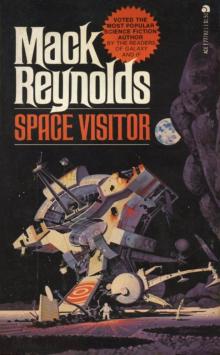 Space Visitor
Space Visitor A Kiss Before Loving
A Kiss Before Loving Episode on the Riviera
Episode on the Riviera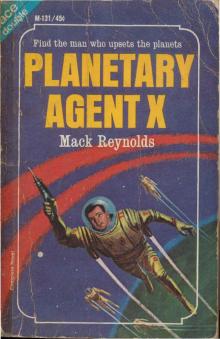 Planetary Agent X
Planetary Agent X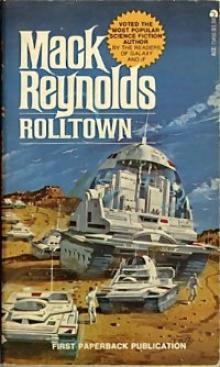 Rolltown bh-3
Rolltown bh-3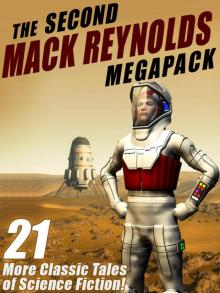 The Second Mack Reynolds Megapack
The Second Mack Reynolds Megapack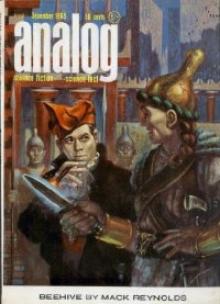 Dawnman Planet up-2
Dawnman Planet up-2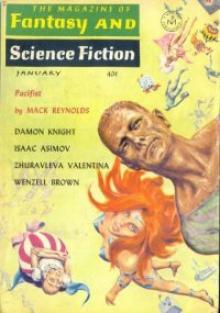 Pacifist
Pacifist The Other Time
The Other Time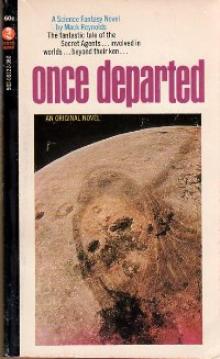 Once Departed
Once Departed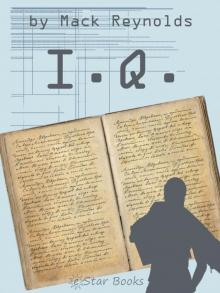 IQ
IQ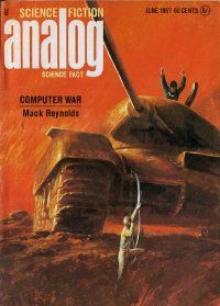 Computer War
Computer War Earth Unaware
Earth Unaware The Rival Rigelians up-3
The Rival Rigelians up-3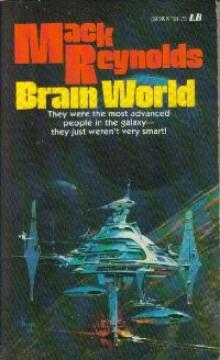 Brain World up-7
Brain World up-7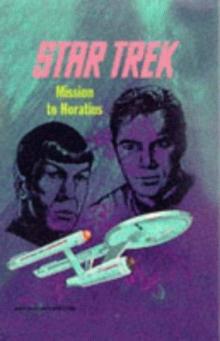 Star Trek - TOS - Mission to Horatius
Star Trek - TOS - Mission to Horatius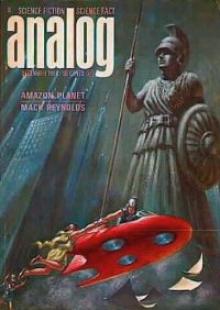 Amazon Planet up-5
Amazon Planet up-5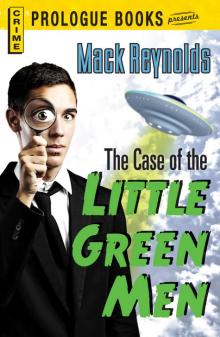 The Case of the Little Green Men
The Case of the Little Green Men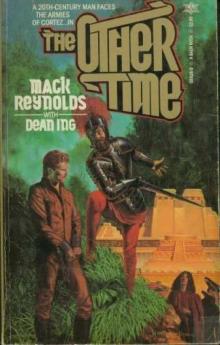 Other Time
Other Time The Mack Reynolds Megapack
The Mack Reynolds Megapack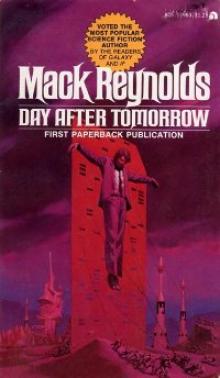 Day After Tomorrow
Day After Tomorrow The Devils & Demons MEGAPACK ®: 25 Modern and Classic Tales
The Devils & Demons MEGAPACK ®: 25 Modern and Classic Tales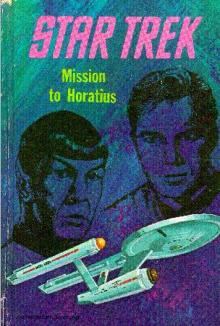 Mission to Horatius
Mission to Horatius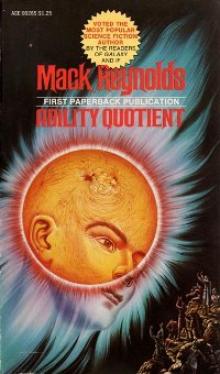 Ability Quotient
Ability Quotient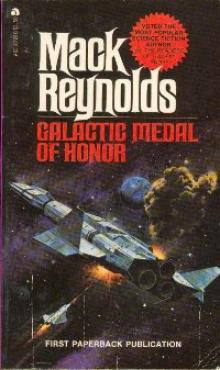 Galactic Medal of Honor
Galactic Medal of Honor Trojan Orbit
Trojan Orbit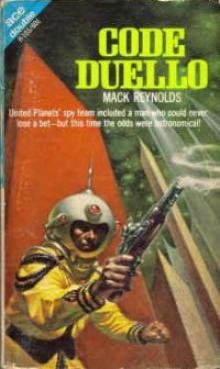 Code Duello up-4
Code Duello up-4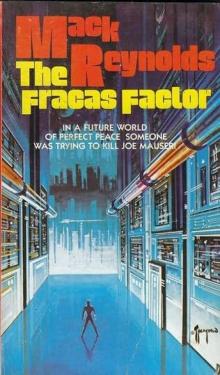 The Fracas Factor
The Fracas Factor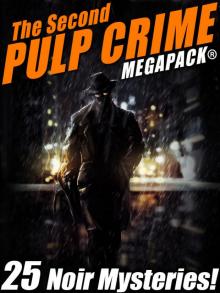 The Second Pulp Crime
The Second Pulp Crime Deathwish World
Deathwish World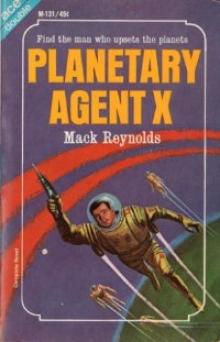 Planetary Agent X up-1
Planetary Agent X up-1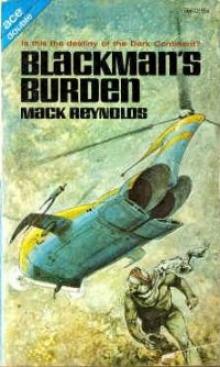 Blackman' Burden na-1
Blackman' Burden na-1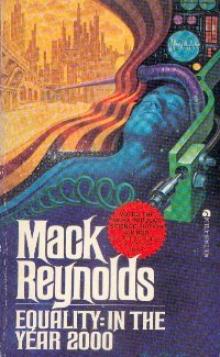 Equality: In the Year 2000 jw-2
Equality: In the Year 2000 jw-2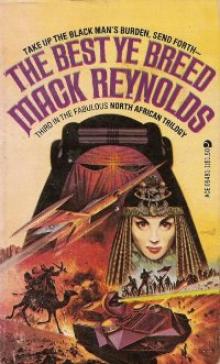 The Best Ye Breed na-3
The Best Ye Breed na-3 The Jet Set
The Jet Set The Rival Rigelians
The Rival Rigelians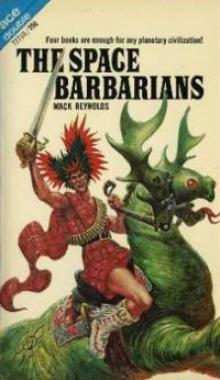 The Space Barbarians
The Space Barbarians